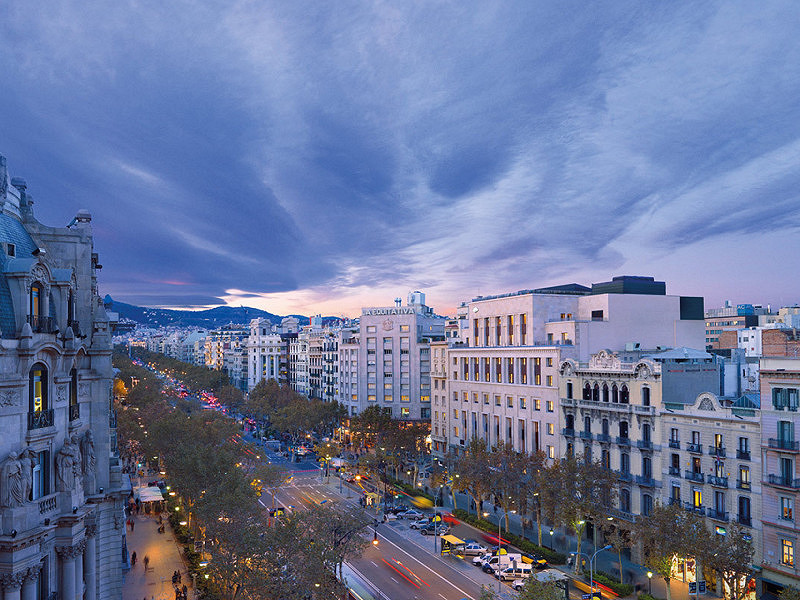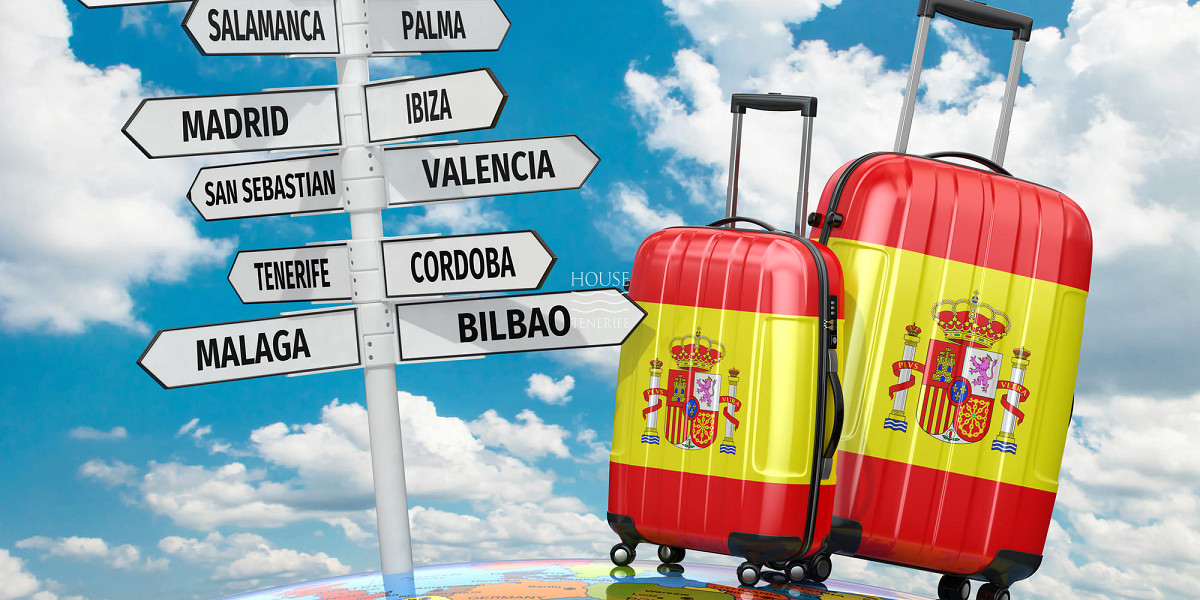
Moving to Spain: Main Options for Immigration
In order to move to Spain permanently, you need to obtain a residence permit (RP). This status provides the opportunity to legally live, work and study in the country, as well as move freely around the Schengen Agreement states.
Let's consider what are the ways to obtain a residence permit in Spain and why it attracts so many immigrants.
7 reasons to choose Spain for immigration
1. Freedom of movement in Europe. Spanish residents can travel visa-free to the Schengen area and stay there for up to 90 days in every six months.
2. Possibility to obtain EU citizenship. Foreigners who have lived in Spain with a residence permit and permanent residence for 10 years can apply for Spanish citizenship.
3. European banking services. Spanish residents have access to the country's financial institutions and can open accounts in banks throughout the European Union.
4. European education. Children of residents can study for free in Spanish state schools and also have an advantage when entering local universities and colleges.
5. Free healthcare. Thanks to social contributions, residents are entitled to free services from state healthcare institutions. Private healthcare, also available through insurance, is often cheaper than in other European countries.
6. Pleasant climate conditions. Spain is famous for its warm Mediterranean climate with up to 320 days of sunshine per year, and the diversity of landscapes offers both hot and cooler regions. 7. Rich in nature and culture. Spain is home to 43 UNESCO World Heritage Sites. The country offers a wealth of natural parks, such as Teide or the Picos de Europa, as well as famous architectural monuments, such as the Alhambra and Burgos Cathedral.
Disadvantages of Immigration to Spain
Long period to obtain citizenship. To become a citizen of Spain, you need to live in the country for 10 years - first 5 years with a temporary residence permit, then another 5 years with a permanent one. For comparison, in Portugal this period is 5 years, and in Greece - 7.
High unemployment. Spain faces one of the highest unemployment rates in Europe, which complicates the situation on the labor market. It is difficult to obtain a residence permit based on work activity, since employers need to prove the absence of suitable candidates among local residents.
Features of work culture. In Spain, a more relaxed approach to work is accepted. In most institutions, from 2 to 5 pm, there is a siesta, and offices, shops and companies close for rest. August is a month of mass vacations due to the intense heat, and many enterprises close for this period.
Difficulties with language. English is poorly spoken here, most residents prefer to communicate in Spanish. In some areas, such as Catalonia and Galicia, local languages are used in everyday communication, which can make adaptation difficult.
Migration Laws in Spain
The main provisions governing the stay of foreigners in Spain and the possibility of obtaining citizenship through naturalization are contained in two key laws:
• Law No. 4 of 11.01.2000 "On the Rights and Freedoms of Foreigners in Spain and Their Social Integration";
• Law No. 14 of 27.09.2013 "On Support for Entrepreneurship and Its Internationalization".
These regulations define the grounds for obtaining national visas, residence permits (RP), as well as the conditions for obtaining a permanent residence permit (PR). In addition, they set out the requirements for foreigners applying for Spanish citizenship through naturalization.
Foreigners who have a residence permit or a permanent residence permit in Spain receive almost all the rights of local residents, with the exception of participation in elections and work in government agencies.
Digital Nomad Visa in Spain
Remote employees of foreign companies can apply for a Digital Nomad visa to live and work in Spain. The main requirement for applicants is a monthly income of at least €2,160.
A Digital Nomad visa allows you to enter Spain and apply for a residence permit. A residence permit is issued for 3 years with the possibility of further extension. After 5 years of living in Spain with this status, you can apply for permanent residence, and after another 5 years - for citizenship.
Documents for a Digital Nomad visa are submitted to the Spanish consulate at your place of residence. The application review period is about one month.
Family members of a digital nomad can also obtain a visa and then apply for a residence permit, permanent residence and citizenship in Spain.
Residence permit in Spain for financially independent persons
Foreigners who receive a stable passive income outside Spain can apply for a residence permit for financially independent persons. Such income can come from renting real estate, business profits, securities or a pension.
The requirements for an applicant for this visa include:
• a minimum passive income of €2,316 per month;
• savings of at least €27,800.
You can add family members to your application. In this case, the income and savings requirements for the main applicant increase by €580 and €6,950 for each relative.
The applicant must also purchase or rent a home in Spain and not leave the country for more than 183 days a year to maintain their residence permit status.
Residence permit for students in Spain
Foreign citizens who have been admitted to accredited Spanish universities can obtain a student residence permit.
First, you must apply for a student visa through the Spanish consulate in your country. The visa is issued for 90 days, during which the student must come to Spain and apply for a student residence permit at the local immigration office within 30 days of entry. You can also apply for a residence permit while already in Spain, for example, if the student arrived on a tourist visa.
A student residence permit is renewed annually until the end of your studies. The application for renewal must be submitted 60 days before the expiration of the current term. After completing your studies, if the student finds a job in Spain, you can change your status to a residence permit for employment.
Students with a residence permit can work in Spain up to 30 hours a week.
Immigration to Spain on the basis of employment
For foreigners wishing to work and live in Spain, there are several types of residence permits (RP).
A RP for temporary residence and self-employment is granted to those planning to open a business in Spain. To obtain it, it is necessary to confirm your professional qualifications, financial resources, and also obtain approval of the business plan from the self-employed trade union.
A RP for temporary residence and work is issued to foreigners on the basis of an employment contract with a Spanish employer. The employer must prove that there are no candidates with the required level of qualifications and experience on the local labor market. The permit can be valid from 90 days to 5 years, depending on the contract.
The EU Blue Card allows highly qualified specialists, as well as their family members, to live and work in Spain. The condition for receiving it is a salary, which must be at least 1.5 times higher than the national average. For example, if a doctor's salary is €3,000, then a foreign specialist must earn at least €4,500.
The EU Blue Card is valid in each EU country according to its own rules. In Spain, it is issued for 12 months with the possibility of extension.
Moving to Spain under the family reunification program
Family members of both Spanish citizens and residents of the country can obtain a residence permit (RP).
A RP for family members of Spanish citizens is granted to:
1. A spouse.
2. A partner with whom a Spanish citizen is in a registered relationship similar to marriage. It is important that the union is registered in the state registry of Spain, and the couple has lived together in the country for more than one year.
3. Children of a Spanish citizen or his/her spouse, or registered partner. A RP can be obtained by children under 21 years of age or older if they are dependent.
4. Any relative who is under the care of a Spanish citizen, for example, an incapacitated family member.
A RP for family members of a Spanish resident, for example, can be obtained by the spouse and children of a foreigner working in the country on an EU Blue Card. They are also granted the right to employment or self-employment in Spain.
To reunite with a family, a resident must prove their financial ability to support a family. The income of a spouse or other family members may also be taken into account. In addition, it is necessary to have housing - own or rented.
Moving to Spain through marriage to a citizen of the country is possible for foreigners who have entered into an official marriage with a Spanish citizen in Spain. In this case, the spouse receives a residence permit for 5 years, and after one year of cohabitation can apply for citizenship.
Immigration to Spain through obtaining refugee status
Foreigners seeking protection from persecution in their country for racial, national, political, religious or social reasons can obtain refugee status in Spain.
To obtain this status, it is necessary to undergo an interview and submit a corresponding application to the Spanish Ministry of Foreign Affairs or to the authorized police station. During the interview, the applicant must explain the reasons why he was forced to leave his country and cannot return there. The application review period can vary from 6 months to 2 years.
Persons who have received refugee status are entitled to social and financial assistance from the state, can officially find employment, and also receive support in learning Spanish and finding housing.
Moving to Spain for Investors
Spain has a government program for investors that allows wealthy foreigners to obtain a residence permit.
This investment program is known as the “golden visa.”
To obtain a Spanish residence permit, investors do not need to pass any Spanish language or cultural exams; to maintain their status, they only need to visit the country several times a year.
Participants in the program can choose one of six investment options to obtain a residence permit:
1. Purchase of residential or commercial real estate for an amount of €500,000 or more.
2. Opening a deposit in a Spanish bank for an amount of €1,000,000 or more.
3. Investments in investment or venture capital funds for an amount of €1,000,000 or more.
4. Purchase of government bonds for an amount of €2,000,000 or more.
5. Purchase of shares in Spanish companies for an amount of €1,000,000 or more.
6. Investment in local business. There is no minimum investment amount established by law, but it is necessary to invest in a socio-economic project and create jobs.
The period for obtaining a residence permit depends on where the investor is located. If he is already in Spain, for example, on a Schengen visa, he can apply for a residence permit online through a lawyer.
If the investor is outside Spain, he must first obtain an investor visa at the Spanish consulate in his country. This visa is valid for 1 year, during which time he must come to Spain and apply for a residence permit.
The first residence permit is issued for 3 years, after which it can be extended for 5 years.
Requirements for program participants. To become a participant in the investment program, you must:
• Be a foreigner over 18 years old.
• Have a legal income.
• Have no criminal record or debts.
Investors must also obtain health insurance and provide proof of their investment. For example, when purchasing real estate, this could be an extract from the cadastral register and a notarized sales contract.
In addition, you must prove your financial solvency - there must be at least €28,800 in your bank account, which is equivalent to four Spanish minimum wages in 2023.
The investor's family can also apply for a Spanish residence permit. These include: spouse, minor children, as well as financially dependent children over 18 years old and dependent parents.
Residence permit in Spain through the purchase of real estate
The purchase of real estate is the most accessible and popular option in the Spanish investment program. 90% of investors receive a Spanish residence permit by purchasing properties worth at least €500,000.
Participants in the program can purchase several properties, the total cost of which must be at least €500,000, and have the right to rent them out, receiving passive income. It is also possible to finance the purchase through a mortgage, but the down payment must be at least €500,000, which corresponds to the minimum value of the property for obtaining a residence permit.
Suitable real estate can be both residential and commercial properties, as well as land. If the investor purchases only commercial real estate, he must additionally either buy residential real estate or rent housing for a long term.
To maintain the residence permit status, the investor must own the property for at least five years. After this period, he can sell the property and apply for permanent residence, and after another five years, for Spanish citizenship.
How to extend a residence permit in Spain
The period during which you need to extend your residence permit in Spain depends on the basis on which it was obtained. For example, students must renew their residence permit annually, while investors can renew their card three years after first receiving it, and then every five years.
According to Spanish immigration laws, a residence permit can be extended no earlier than 60 days before its expiration. The cost of the procedure depends on the type of residence permit and is usually around €16.
To extend the status, it is necessary to maintain the conditions under which it was issued. Thus, investors must remain property owners, students must continue their studies at Spanish universities, and workers must be employed by a Spanish company.
An application for an extension of a residence permit is submitted to the Spanish Migration Service either in person or through a special government portal on the Internet.
Cities of Spain: Which to Choose for Living
Madrid is the capital and largest city of Spain, home to over 3 million people. This city is an important industrial, financial and cultural center of the country.
Madrid has a well-developed infrastructure: there is a metro, two large railway stations, many shopping centers, restaurants and nightclubs. The capital of Spain is known for its theaters and concert halls, of which there are more than ten. The only drawback is that Madrid is located far from the sea, and the nearest beach is 430 kilometers away.
For a family of four, the average monthly expenses in Madrid are about 3,300 euros. Renting a one-bedroom apartment will cost about 1,100 euros, and a three-bedroom apartment will cost about 1,800 euros.
Barcelona is the main city of Catalonia and the second most populous in Spain with over 1.6 million residents. Two languages are spoken here: Spanish and Catalan.
Barcelona has a well-developed transport system, including a metro, and one of the 11 lines leads directly to the international airport. The city also attracts entrepreneurs, as it is a major industrial and commercial hub in Spain.
Digital nomads will feel comfortable in Barcelona - the city has more than 20 coworking spaces, and high-speed Internet is available everywhere.
For a family of four, the cost of living in Barcelona is about 3,500 euros per month. Renting a one-bedroom apartment costs an average of 1,000 euros, and a three-bedroom apartment costs 1,700 euros.
Valencia is the third largest city in Spain, located on the Mediterranean coast.
The city is popular among expats due to its affordable housing, while the level of infrastructure is almost as good as Madrid and Barcelona. Valencia has many cultural sites, about 50 museums, many restaurants, international schools and three universities. The city also has a metro.
Monthly living expenses in Valencia for a family of four are approximately 2,900 euros. Renting a one-bedroom apartment will cost an average of 800 euros, and a three-bedroom apartment will cost 1,300 euros.
Torrevieja is a small resort town on the coast in the province of Alicante with a population of about 100 thousand people. A large number of Russian-speaking immigrants live here, so in some establishments you can find staff who speak Russian.
The city is suitable for a calm and measured life. It is not as fast-paced as in Madrid or Barcelona, but it has everything you need: kindergartens, private schools, shopping centers and beaches. However, finding a job in Torrevieja can be difficult due to the small size of the city.
A family of four will need about 2,000 euros per month to live comfortably in Torrevieja. Renting a one-room apartment costs an average of 500 euros, and a three-room apartment costs 1,000 euros.
Alicante is a port city in the southeast of Spain with a population of about 300,000 people. The main language of communication is Spanish, but locals often speak the Valencian dialect.
Alicante has a 15-kilometer coastline with sandy beaches that have been awarded the prestigious Blue Flag. The city is also known for its many bars, restaurants, nightclubs, and shopping centers. Among the cultural attractions, the Museum of Modern Art stands out, where you can see works by Pablo Picasso and Salvador Dali, and it is absolutely free.
Alicante has international and private schools, as well as a Russian educational center where expats can study Spanish.
There is no metro in the city, but a well-developed ground transportation system includes a bus station and a train station. The international airport is only 12 kilometers from Alicante.
For a family of four, living in Alicante will cost about 2,500 euros per month. You can rent a one-room apartment for 650 euros, and a three-room apartment for 1,000 euros.
Marbella is a prestigious resort in the south of Spain with a population of about 130 thousand people. The city attracts both tourists and immigrants, among whom there are many Russians, Germans and British.
Marbella's beaches, of which there are more than twenty, have also been awarded the Blue Flag for cleanliness and safety. The city has elite areas with luxurious villas, estates, five-star hotels and boutiques. You can often meet world celebrities and wealthy people here.
You can always buy fresh fruits, vegetables, cheese, meat, fish and Spanish wine at the famous Marbella market Mercado Municipal De Marbella.
The nearest international airport is located 50 kilometers from Marbella. There is no metro in the city, but the bus service is well developed, and you can also use a taxi.
The approximate cost of living for a family of four in Marbella is about 3,000 euros per month. Rent for a one-room apartment costs an average of 900 euros, and for a three-room apartment - about 1,700 euros.
Emigration to Spain: Key Points
1. To legally reside in Spain, foreigners must obtain one of the following statuses: residence permit, permanent residence or citizenship.
2. Residence permits can be obtained on various grounds, such as study, work, family reunification or investment.
3. Investors can obtain a residence permit in Spain by investing from 500,000 euros in real estate. You can also invest in shares or start a business.
4. Holders of a Spanish residence permit can freely travel to the Schengen countries, receive medical care in Spain, study and open accounts in EU banks.
5. After living in Spain for more than 10 years, a resident has the right to apply for citizenship.
6. When choosing a place to live in Spain, you should consider your interests and financial capabilities. Cities such as Torrevieja are suitable for a quiet lifestyle, and for doing business or getting an education, it is better to consider large cities such as Madrid or Barcelona.



